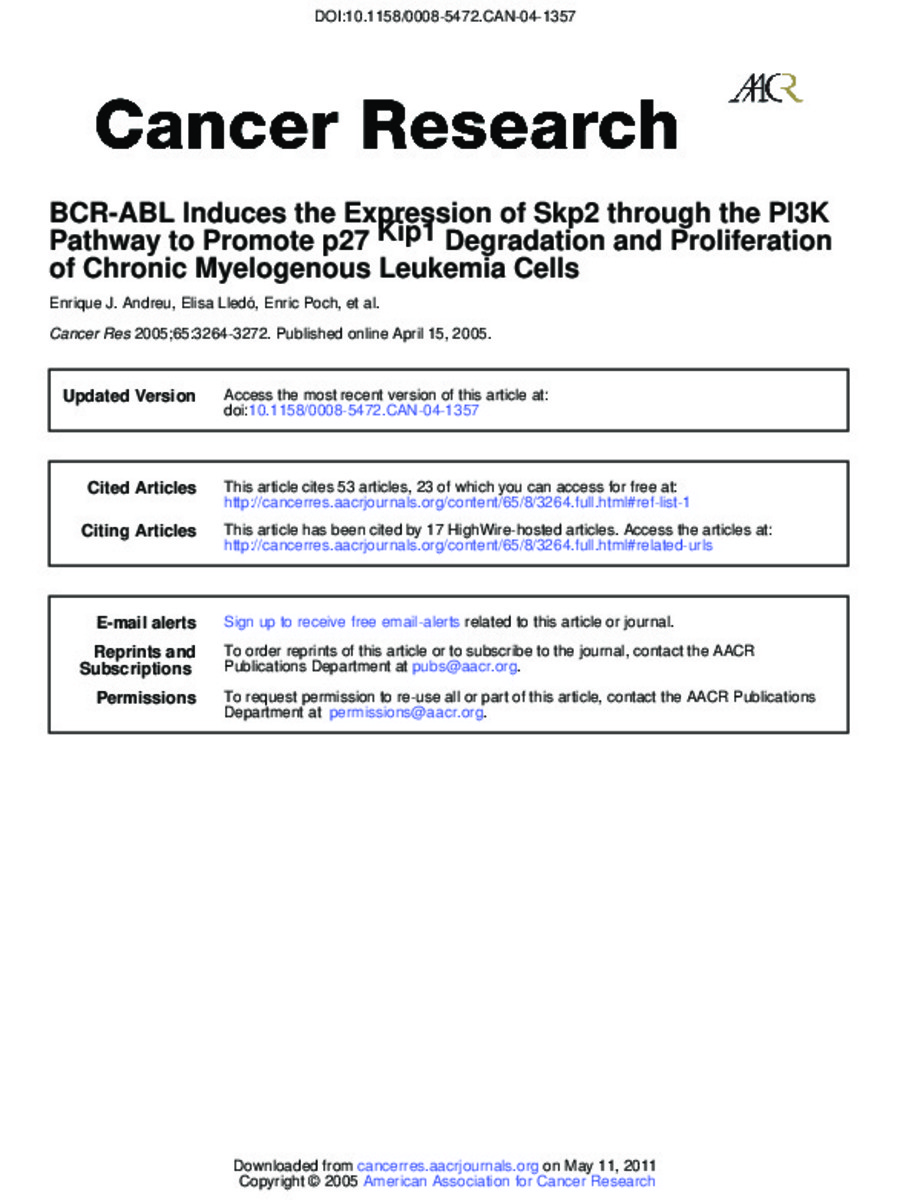Registro completo de metadatos
| Campo DC | Valor | Lengua/Idioma |
|---|---|---|
| dc.creator | Andreu, E.J. (Enrique José) | - |
| dc.creator | Lledo, E. (Elisa) | - |
| dc.creator | Poch, E. (Enric) | - |
| dc.creator | Ivorra, C. (Carmen) | - |
| dc.creator | Albero, M.P. (M. Pilar) | - |
| dc.creator | Martinez-Climent, J.A. (José Ángel) | - |
| dc.creator | Montiel-Duarte, C. (Cristina) | - |
| dc.creator | Rifon, J. J. (Jose J.) | - |
| dc.creator | Perez-Calvo, J. (Javier) | - |
| dc.creator | Arbona, C. (C.) | - |
| dc.creator | Prosper-Cardoso, F. (Felipe) | - |
| dc.creator | Perez-Roger, I. (Ignacio) | - |
| dc.date.accessioned | 2011-05-09T11:30:14Z | - |
| dc.date.available | 2011-05-09T11:30:14Z | - |
| dc.date.issued | 2005 | - |
| dc.identifier.citation | Andreu EJ, Lledo E, Poch E, Ivorra C, Albero MP, Martinez-Climent JA, et al. BCR-ABL induces the expression of Skp2 through the PI3K pathway to promote p27Kip1 degradation and proliferation of chronic myelogenous leukemia cells. Cancer Res 2005 Apr 15;65(8):3264-3272. | es_ES |
| dc.identifier.issn | 1538-7445 | - |
| dc.identifier.uri | https://hdl.handle.net/10171/17900 | - |
| dc.description.abstract | Chronic myelogenous leukemia (CML) is characterized by the expression of the BCR-ABL tyrosine kinase, which results in increased cell proliferation and inhibition of apoptosis. In this study, we show in both BCR-ABL cells (Mo7e-p210 and BaF/3-p210) and primary CML CD34+ cells that STI571 inhibition of BCR-ABL tyrosine kinase activity results in a G(1) cell cycle arrest mediated by the PI3K pathway. This arrest is associated with a nuclear accumulation of p27(Kip1) and down-regulation of cyclins D and E. As a result, there is a reduction of the cyclin E/Cdk2 kinase activity and of the retinoblastoma protein phosphorylation. By quantitative reverse transcription-PCR we show that BCR-ABL/PI3K regulates the expression of p27(Kip1) at the level of transcription. We further show that BCR-ABL also regulates p27(Kip1) protein levels by increasing its degradation by the proteasome. This degradation depends on the ubiquitinylation of p27(Kip1) by Skp2-containing SFC complexes: silencing the expression of Skp2 with a small interfering RNA results in the accumulation of p27(Kip1). We also demonstrate that BCR-ABL cells show transcriptional up-regulation of Skp2. Finally, expression of a p27(Kip1) mutant unable of being recognized by Skp2 results in inhibition of proliferation of BCR-ABL cells, indicating that the degradation of p27(Kip1) contributes to the pathogenesis of CML. In conclusion, these results suggest that BCR-ABL regulates cell cycle in CML cells at least in part by inducing proteasome-mediated degradation of the cell cycle inhibitor p27(Kip1) and provide a rationale for the use of inhibitors of the proteasome in patients with BCR-ABL leukemias. | es_ES |
| dc.language.iso | eng | es_ES |
| dc.publisher | American Association for Cancer Research | es_ES |
| dc.rights | info:eu-repo/semantics/openAccess | es_ES |
| dc.subject | Carrier proteins | es_ES |
| dc.subject | Leukemia. Myelogenous | es_ES |
| dc.title | BCR-ABL induces the expression of Skp2 through the PI3K pathway to promote p27Kip1 degradation and proliferation of chronic myelogenous leukemia cells | es_ES |
| dc.type | info:eu-repo/semantics/article | es_ES |
| dc.relation.publisherversion | http://cancerres.aacrjournals.org/content/65/8/3264.long | es_ES |
Ficheros en este ítem:
Estadísticas e impacto
Los ítems de Dadun están protegidos por copyright, con todos los derechos reservados, a menos que se indique lo contrario.






